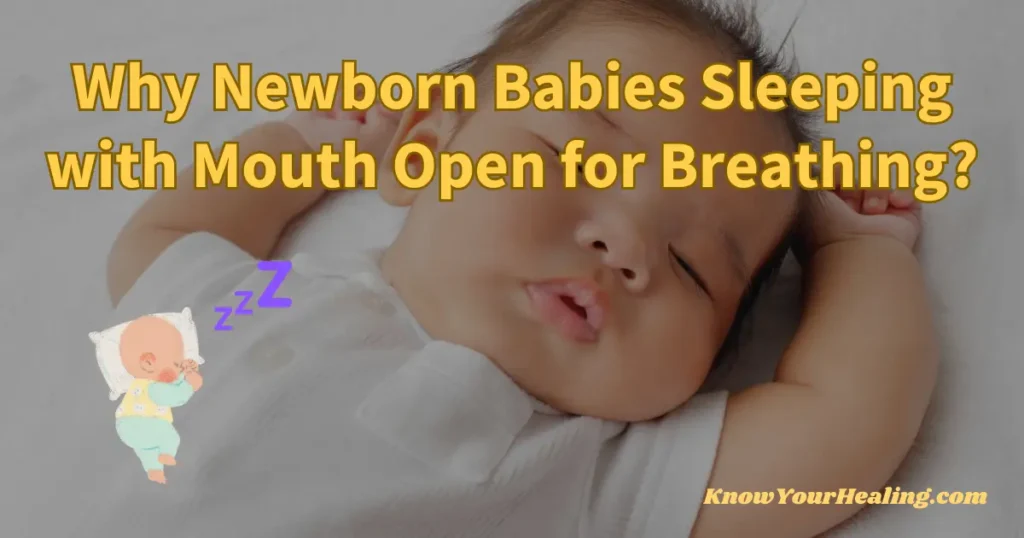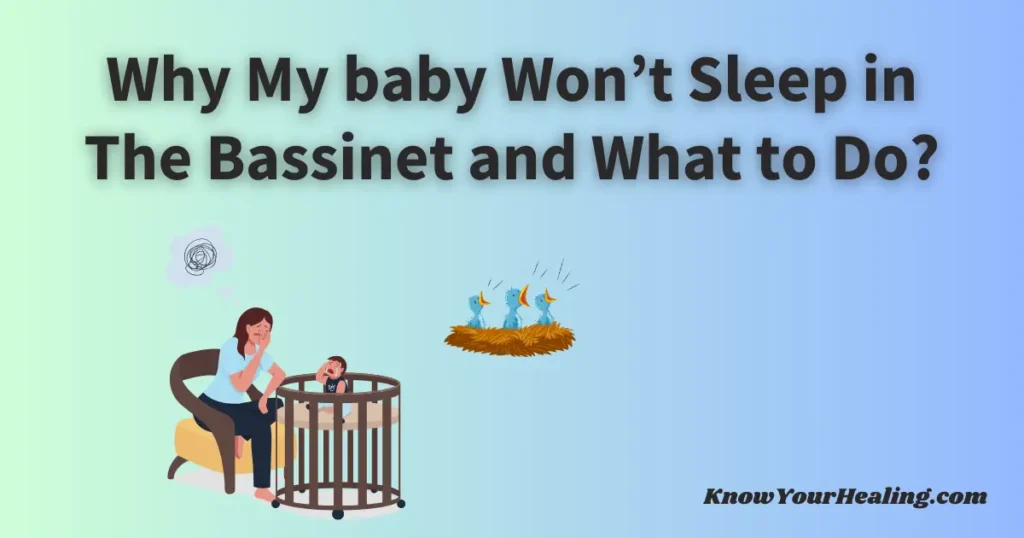Babies sleeping with mouth open is a common concern for many parents. Understanding why newborns might breathe this way can help relieve your worries and ensure your baby is healthy.
In this article, you will discover the reasons behind this behavior and learn if it is something to be worried about or just a natural part of growth.
Mouth breathing in infants can sometimes be due to nasal congestion or other minor issues that force them to breathe through their mouths.
In other cases, it might signal more significant concerns, such as sleep apnea, when a baby’s upper airway is obstructed. This condition is linked to enlarged tonsils.
For many parents, recognizing these signs early can be crucial for addressing potential health concerns promptly.
The discussion aims to provide clarity and actionable insights highlighting the causes and implications of mouth breathing in babies, t
Parents will gain confidence in identifying normal behaviors and those that might require a doctor’s attention.
Understanding Infant Breathing Patterns

Infant breathing patterns are unique and can vary from adult breathing. Recognizing these patterns is crucial for identifying potential health issues in young babies, such as open-mouth breathing and nasal congestion.
Normal Respiratory Rates in Newborns
Healthy newborn babies typically breathe at different rates compared to adults.
A newborn’s regular respiratory rate is 30 to 60 breaths per minute. However, it is essential to note that their breathing can be irregular. Newborns often pause for a few seconds and then resume.
Young babies are obligate nasal breathers, which means they primarily breathe through their noses.
This is essential for breastfeeding and simultaneous breathing.
Mom and dad may worry if they see their baby sleep with their mouth open frequently; this might indicate nasal obstruction or chronic congestion.
Mouth Breathing Versus Nasal Breathing
Mouth breathing occurs when a baby uses their mouth instead of their nose. This can result in a dry mouth and disrupt the balance of natural bacteria. Nasal passages should remain transparent to prevent this from becoming a habit.
Persistent mouth breathing in newborns might signal underlying issues like a blocked nose or deviated septum.
Open-mouth breathing may be caused by temporary factors such as a stuffy nose due to a cold.
Nasal breathing is critical for healthy facial structure and development in young children.
Parents should look for signs of mouth breathing, such as unusual breathing sounds or restless sleep.
Consulting a healthcare provider is advised if mouth breathing is noticeable regularly to prevent potential issues.
Treatment options may include saline solutions to clear nasal congestion or professional advice for specific health problems.
Causes of Mouth Breathing in Newborns

Various factors, including anatomical and developmental issues, environmental influences, and health-related problems, can cause babies to sleep with their mouths open.
Each factor affects a baby’s airway functions, impacting their ability to breathe normally through the nose.
Anatomical and Developmental Factors
Newborn babies are naturally obligate nasal breathers, meaning their nasal passages are the primary airway for breathing.
However, anatomical factors such as a deviated septum or enlarged tonsils can lead to persistent mouth breathing. These issues may cause an upper airway obstruction when a newborn sleeps, leading them to breathe through their mouth as an alternative.
In addition, some babies may have a naturally smaller or differently shaped palate, contributing to open-mouth breathing.
A high-arched palate or differences in facial structure may also impact the effectiveness of nose breathing.
New parents must monitor these signs and consult a healthcare provider if persistent mouth breathing occurs.
Environmental Influences
Environmental conditions, like dry air in the baby’s room, can contribute to nasal congestion, forcing the child to breathe through an open mouth.
A stuffy nose from dust, smoke, or other environmental allergens might result in mouth breathing as a temporary adaptation.
Using a cool mist humidifier can help maintain moisture levels, which may ease nasal breathing.
Saline drops, or a bulb syringe can also aid in clearing a blocked nose and providing nasal relief.
Such solutions may reduce open-mouth breathing by helping young babies clear their nasal passages.
Health-Related Issues
Health problems like chronic congestion from colds or respiratory infections can lead to open-mouth breathing in newborns.
In some cases, more serious health conditions such as sleep disorders or symptoms of sleep apnea, marked by irregular breathing patterns, can hinder normal nose breathing.
This often results in occasional mouth breathing during sleep.
Persistent mouth breathing might indicate sleep disorders or underlying medical conditions that require professional advice.
Addressing these health issues is essential for ensuring the baby’s health and improving sleep quality.
Consulting an ENT specialist can help identify the underlying issue and explore appropriate treatment options.
Potential Risks and Complications

Babies sleeping with mouth open can lead to several health concerns. These issues may affect oral health, increase the chance of respiratory infections, and impact overall well-being.
Oral and Dental Health Concerns
Young babies who engage in chronic mouth breathing can face several dental issues.
When a baby sleeps with an open mouth, it can lead to a dry mouth, which reduces saliva production.
Saliva is essential for cleaning harmful bacteria from the mouth. Without enough saliva, there’s an increased risk of tooth decay and gum disease.
Moreover, frequent mouth breathing can alter the shape of a baby’s facial structure.
This can result in malocclusion or improper tooth alignment. As this worsens over time, the child may develop an open bite.
It is crucial to identify these issues early through regular dental check-ups. If symptoms persist, an orthodontic evaluation might be necessary.
Respiratory Infections and Illnesses
Mouth breathing in babies can also increase the risk of respiratory infections.
When newborns sleep with their mouths open, they bypass the nasal passages, which are important for filtering pathogens.
This can lead to a higher susceptibility to infections like colds and sinusitis.
Nasal congestion caused by a stuffy nose can exacerbate these problems, making it even more difficult to switch to nasal breathing.
Using saline drops or a bulb syringe can help clear blockages in a baby’s nose.
Ensuring good air quality in the baby’s room, possibly with a cool mist humidifier, may also help prevent these infections.
Regular consultation with a healthcare provider can help manage these potential issues.
Monitoring and Managing Mouth Breathing

Babies sleeping with mouth open can indicate various health concerns, from simple nasal congestion to more complex issues like sleep disorders.
Identifying the cause is crucial for appropriate intervention and to ensure the baby’s overall well-being.
When to Consult a Pediatrician
If a newborn baby consistently sleeps with an open mouth, it may be a sign of nasal congestion or other health conditions.
New parents should pay attention to persistent mouth breathing, which could lead to dry mouth, tooth decay, or disrupted sleep cycles.
If the baby exhibits symptoms like restless sleep or frequent waking, which could indicate a sleep disorder or a blocked nose, a pediatrician should be consulted.
Monitoring signs such as a deviated septum or chronic congestion can help determine whether medical advice or intervention is needed.
Young babies may develop facial structure issues due to habitual breathing through their mouth, so early detection is important.
Professional advice from a healthcare provider is crucial when any concerning symptoms arise.
Treatment and Intervention Strategies
There are several strategies available for managing open-mouth breathing in young children.
Simple steps like clearing nasal passages with a bulb syringe or using saline drops can help relieve nasal congestion.
Keeping the baby’s room humidified with a cool mist humidifier may promote nasal breathing.
Professional intervention, such as myofunctional therapy or orthodontic treatment, might be necessary if mouth breathing is linked to more complex conditions.
Encouraging babies to be obligate nasal breathers helps them avoid long-term mouth breathing and potential issues such as facial development concerns or an increased risk of respiratory infections.
Early and appropriate treatment options can significantly benefit the child’s health.
Preventative Measures and Best Practices

When newborn babies sleep with their mouths open, this can lead to health issues such as dry mouth and potential respiratory problems. Implementing best practices helps ensure a comfortable sleeping environment and encourages proper nasal breathing.
Creating an Optimal Sleeping Environment
A baby’s room should maintain an ideal temperature and humidity.
Cool mist humidifiers keep the air moist, reducing the occurrence of a dry mouth.
It’s crucial to regularly vacuum and dust the room to limit allergens that might cause nasal congestion.
Monitoring the air quality prevents issues like a blocked nose, allowing the baby to breathe freely through their nasal passages.
Ensuring the baby’s bedding is clean and fragrant-free can minimize irritants contributing to mouth breathing.
Consulting with a healthcare provider when persistent mouth breathing occurs can provide valuable guidance on maintaining a safe environment tailored to the child’s needs.
Promoting Nasal Breathing
Newborn babies are obligate nasal breathers. Encouraging nasal breathing can improve their sleep quality.
Saline drops can help clear nasal congestion, making breathing through the nose easier for the baby.
Using a bulb syringe to clear the baby’s nose gently is often recommended to manage a stuffy nose.
Breastfeeding supports proper facial structure and helps develop the muscles essential for nasal breathing.
Regular checks for signs of mouth breathing can alert caregivers to potential causes, such as a deviated septum or other airway obstructions.
Consulting with an ENT specialist can provide insights into underlying issues contributing to chronic mouth breathing.
Frequently Asked Questions
Newborn babies sleeping with their mouths open can concern many parents. Understanding the causes, potential health implications, and ways to address the issue effectively is important.
Is it normal for a newborn to sleep with their mouth open?
Newborns can sometimes sleep with their mouths open for nasal congestion or other reasons. Typically, they should breathe through their noses, but mouth breathing may occur if there’s a blockage. It’s normal occasionally, but frequent occurrences should be monitored.
How can I stop my baby from opening his mouth while sleeping?
Clear nasal passages reduce mouth breathing. Using a humidifier or carefully cleaning the baby’s nose can also help avoid. If the issue persists, seek medical advice.
When is it too late to fix mouth breathing?
Addressing mouth breathing in babies early is crucial, as it can impact their development. While tackling the problem during infancy is best, interventions can still be helpful later. A healthcare professional should evaluate ongoing mouth breathing to determine appropriate measures.
Does sleeping with mouth open mean anything?
Sleeping with an open mouth might indicate underlying issues such as nasal congestion or enlarged tonsils, which could obstruct normal breathing. Over time, it may lead to oral health concerns or sleep disturbances. Identifying and addressing the cause is important for overall health.
How do you stop mouth breathing while sleeping?
To help stop mouth breathing, ensure the baby is not experiencing nasal congestion, possibly by using a nasal aspirator. Encouraging nasal breathing and consulting with a healthcare provider can also be beneficial. Sometimes, specific training or therapies might be needed.
Is mouth breathing linked to ADHD?
Some research suggests a potential link between persistent mouth breathing and behavioral issues like ADHD. This is because mouth breathing may affect sleep quality and brain development.
We need further assessment to clarify this connection and guide appropriate interventions.




